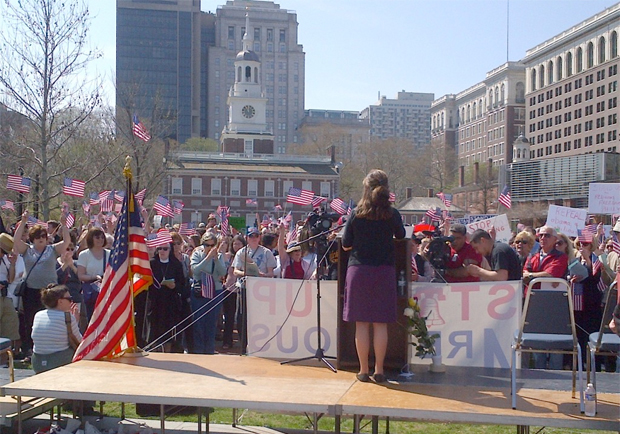Despite differences over contraception, evangelical leaders have fallen in step with Catholic bishops over what they see as federal compulsion to provide services against their conscience.
In 2011, the Obama administration ruled that religious institutions would be required to provide employees with free contraceptive coverage. President Obama said in February that insurers would be responsible for paying for the contraception, but those who opposed the new rule suggested insurers could simply raise premiums to cover the cost.
Searching for strategies, some evangelicals filed lawsuits. Others followed Catholic bishops’ lead, releasing letters to be read in churches.
At least 117 Catholic bishops issued statements to their dioceses, asking for their prayers and political opposition to the ruling. Many told priests to read the letters aloud to congregants during Sunday masses. Members of the National Association of Evangelicals (NAE) asked for advice on whether to distribute a similar letter, said Galen Carey, vice president of government relations. The organization decided not to take the unprecedented step because its leaders believe that reading a letter on a political issue should be done rarely, if at all.
Evangelicals including Chuck Colson, Albert Mohler, and Jim Daly specifically said the issue was not just a Catholic one. While evangelicals do not take the same stance against all contraception, they generally oppose forms of birth control that block uterine implantation.
Evangelical institutions Colorado Christian University, Louisiana College, and Geneva College joined Catholic universities in filing lawsuits to challenge the rule. Spokespeople for the Becket Fund and the Alliance Defense Fund told CT they expect to file more lawsuits.
“This is one of the more remarkable displays of unity that I’ve seen in a long time,” said Paul Kengor, a political science professor at Grove City College. “The most common tactic or response Catholics and evangelicals will probably pursue is within the courts. It’s not that they sought this issue; this came to them.”
Evangelical leaders particularly noted that the administration did not widen an exemption that applied narrowly to churches, so the contraceptive ruling would still apply to Christian colleges, parachurch institutions, and other groups not directly connected to a church. Many fear the narrow exemption for religious groups could set a poor precedent for future decisions.
“The administration anticipated and tried to address Catholic concerns more directly than they did evangelical concerns,” Carey said. “They’re probably surprised at how important we think the issue is, even if we’re talking about it from a different angle.”
Evangelical and Catholic leaders have long found common ground on social issues, but observers say today they are collaborating more closely than usual to resist the new rule.
More than 600 religious leaders and professors from institutions such as Wheaton College, Baylor University, and the University of Notre Dame signed a Becket Fund letter of protest that labeled the contraceptive mandate “a grave violation of religious freedom.”
“What began as a marriage of convenience has blossomed,” said Robert George, a Princeton University professor, who is Catholic. “On this issue, we’re united by common principles and common threat, and that’s a powerful combination.”
The hierarchical structure of the Roman Catholic Church carries significant advantages and disadvantages, said Francis Beckwith, who was president of the Evangelical Theological Society until he converted to Catholicism. Catholics bring institutional weight and have the President’s ear (Obama personally called New York Archbishop Timothy Dolan about the revised rule), but they often do not have evangelicals’ flexibility or grass-roots efforts.
“Sometimes they take too long to respond because they want to get their ducks in a row,” Beckwith said.
Americans appear divided on whether contraception must be provided by religious employers. Among those familiar with the debate, 48 percent support an exemption for religious institutions that object to the use of contraceptives, while 44 percent say they should be required to cover contraceptives just like other employers, according to a February poll from the Pew Center. A 2010 survey from the NAE and Gallup showed that about 90 percent of evangelicals believe hormonal and barrier methods of contraception to be morally acceptable. However, the Pew poll found that evangelicals are more likely than Catholics to believe that religious groups should be exempted; 68 percent of evangelicals favor an exemption, compared to 55 percent of Catholics.
“Questions about the proper use of our sexual powers are irreducibly religious because they’re connected to what the good life is and how we treat others,” Beckwith said. “People can make a distinction between what they believe and the right of others to hold different views.”
Copyright © 2012 Christianity Today. Click for reprint information.
Related Elsewhere:
Other Christianity Today articles on the contraception mandate include:
Erasing Women: How Both Sides Contribute to the Media Blackout on Female Pro-Lifers | We could work harder to prevent unfortunate photo-ops. (February 20, 2012)
Where the Women Were During the House Contraception Mandate Hearing | The effort to tarnish religious freedom concerns as sexism is clever but wrong. (February 17, 2012)
Obama Does Not Widen Religious Exemption for Contraceptive Mandate | The burden to cover contraception shifts to the insurance companies, but an earlier exemption for religious groups will not change. (February 10, 2012)
Evangelicals Mounting Concerns over Obama Administration’s Contraceptive Mandate | Protestants are increasingly joining Catholics in protesting Health & Human Services mandate. (February 3, 2012)
See CT’s news section and liveblog for more news updates.










